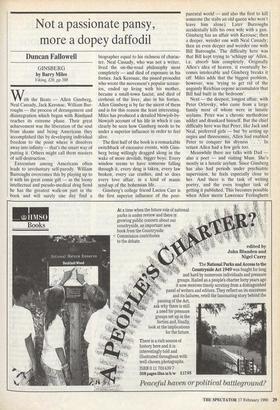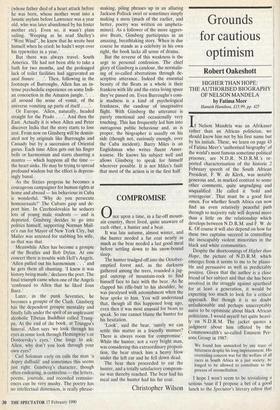Not a passionate pansy, more a dopey daffodil
Duncan Fallowell
GINSBERG by Barry Miles
Viking, £20, pp.588
With the Beats — Allen Ginsberg, Neal Cassady, Jack Kerouac, William Bur- roughs — the process of derangement and disintegration which began with Rimbaud reaches its extreme phase. Their great achievement was the liberation of the soul from shame and being Americans they accomplished this by developing individual freedom to the point where it dissolves away into infinity — that's the smart way of putting it. Others might call them masters of self-destruction.
Extremism among Americans often leads to involuntary self-parody. William Burroughs overcomes this by playing up to it with his great comic gift — as the loony intellectual and pseudo-medical drug fiend he has the greatest walk-on part in the book and will surely one day find a
biographer equal to his richness of charac- ter. Neal Cassady, who was not a writer, lived the on-the-road philosophy most completely — and died of exposure in his forties. Jack Kerouac, the pissed prosodist who wrote the movement's popular scenar- ios, ended up living with his mother, became a small-town fascist, and died of cirrhosis of the liver, also in his forties. Allen Ginsberg is by far the nicest of them and is for this reason the least interesting. Miles has produced a detailed blowjob-by- blowjob account of his life in which it can clearly be seen how Ginsberg needs to be under a superior influence in order to feel alive.
The first half of the book is a remarkable switchback of excessive events, with Gins- berg being willingly dragged along in the wake of more devilish, bigger boys. Every window seems to have someone falling through it, every drug is taken, every law broken, every car crashes, and so does every love affair, in a kind of manic send-up of the bohemian life.
Ginsberg's college friend Lucien Carr is the first superior influence of the post- parental world — and also the first to kill someone (he stabs an old queen who won't leave him alone). Later Burroughs accidentally kills his own wife with a gun. Ginsberg has an affair with Kerouac; then a deeper, weirder one with Neal Cassady; then an even deeper and weirder one with Bill Burroughs. The difficulty here was that Bill kept trying to "schlupp up' Allen, i.e. absorb him completely. Originally Allen's idea of heaven, it eventually be- comes intolerable and Ginsberg breaks it off. Miles adds that the biggest problem, however, was 'trying to get rid of the ungainly Reichian orgone accumulator that Bill had built in the bedroom'.
Next — the deepest, longest affair, with Peter Orlovsky, who came from a large family most of whom were in lunatic asylums. Peter was a chronic methedrine addict and drunkard himself. But the chief difficulty here was that Peter, like Jack and Neal, preferred girls — but `by setting up orgies and threesomes, Allen had enabled Peter to conquer his shyness . In return Allen had a few girls too.
Meanwhile there are talks with Dad — also a poet — and visiting Mum. She's mostly in a lunatic asylum. Since Ginsberg has also had periods under psychiatric supervision, he feels especially close to her. And there is the task of writing poetry, and the even tougher task of getting it published. This becomes possible when Allen meets Lawrence Ferlinghetti (whose father died of a heart attack before ' he was born, whose mother went into a lunatic asylum before Lawrence was a year old, who was later abandoned by his foster mother etc). Even so, it wasn't plain sailing. 'Weeping as he read Shelley's "West Wind", he knew that he wrote best himself when he cried; he hadn't wept over his typewriter in a year.'
But there was always travel. South America. 'He had not been able to take a bath for two months, and the prolonged lack of toilet facilities had aggravated an anal. fissure . . .'. Then, following in the footsteps of Burroughs, Allen has an in- tense psychedelic experience on some Indi- an concoction in the Amazon jungle. `. . . all around the noise of vomit, of the universe vomiting up parts of itself .
Or Europe. 'Allen, naturally, headed straight for the Prado . . And then the East. Actually it is when Allen and Peter discover India that the story starts to lose zest. From now on Ginsberg will be domin- ated not by originals like Burroughs and Cassady but by a succession of Oriental gurus. Each time Allen gets out his finger bells or harmonium and starts chanting a mantra — which happens all the time — the heart sinks. He may be trying to spread profound wisdom but the effect is depress- ingly banal.
As the Sixties progress he becomes a courageous campaigner for human rights at home and abroad — his behaviour in Cuba is wonderful. `Why do you persecute homosexuals?' The Cubans gasp and de- port him. In Czechoslovakia he seduces lots of young male students — and is deported. Ginsberg decides to go into politics himself, supporting Norman Mail- er's run for Mayor of New York City, but Mailer was arrested for stabbing his wife, so that was that.
Meanwhile Allen has become a groupie of the Beatles and Bob Dylan. At one concert there is trouble with Hell's Angels. 'Allen pulled out his harmonium . . and he gets them all chanting. 'I knew it was history being made,' declares the poet. The final triumph came when one of the Angels 'confessed to Allen that he liked Joan Baez.'
Later, in the punk Seventies, he becomes a groupie of the Clash. Ginsberg has the dependent groupie mentality and finally falls under the spell of an unpleasant alcoholic Tibetan Buddhist called Trung- pa. At the end of the book, at Trungpa's funeral, Allen says 'we look through his eyes as some look through Hemingway's or Dostoevsky's eyes.' One longs to ask: Allen, why don't you look through your own eyes?
Carl Soloman early on calls the man 'a dopey daffodil' and sometimes this seems just right. Ginsberg's character, though often endearing, is centreless — the letters, poems, journals, and recorded reminisc- ences can be very mushy. The poetry has no intellectual dimension, is really phrase-
making, piling phrases up in an alluring Jackson Pollock swirl or sometimes simply making a mess (much of the earlier, and better, poetry was written on ampheta- mines). As a follower of the more aggres- sive Beats, Ginsberg participates in an amazing, breathtaking story. When in due course be stands as a celebrity in his own right, the book lacks all sense of drama.
But the reverse of this weakness is the urge to personal confession. The chief glory of Ginsberg is candour, the normalis- ing of so-called aberrations through de- scriptive utterance. Indeed the essential beauty of the Beats as a whole is their frankess with life and the extra living space they've passed on. Even Burroughs's com- ic madness is a kind of psychological frankness, the candour of imaginative flight. With Ginsberg the utterance is purely emotional and occasionally very touching. This has frequently led him into outrageous public behaviour and, as is proper, the biographer is usually on his side (though not, curiously enough, over the Cuba incident). Barry Miles is an Englishman who writes fluent Amer- icanese. He knows his subject well and allows Ginsberg to speak for himself wherever possible. It is not Miles's fault that most of the action is in the first half.



















































 Previous page
Previous page